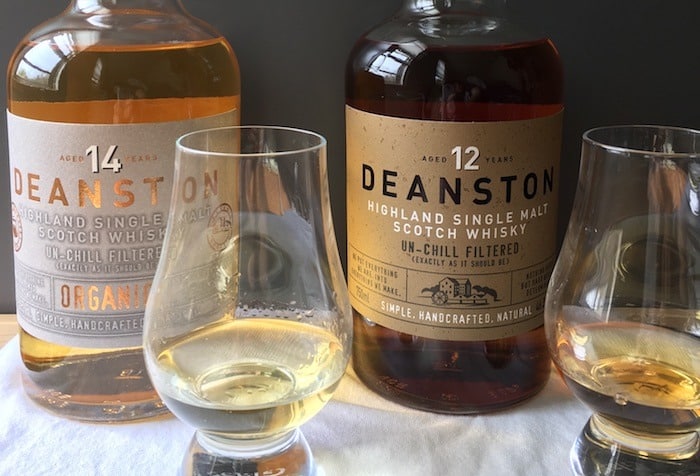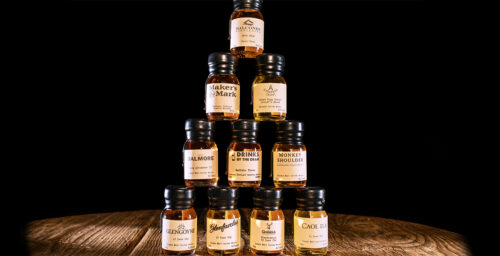While demand has been growing for organic food and ingredients – meaning “fully sustainable and environmentally sound,” according to the Organic Food Federation – the concept has been relatively slow to make its way into the world of scotch whisky (perhaps justifiably due to the aging process).
As some Scottish distilleries have started to pick up this trend, this review will focus on Highland-based Deanston, comparing its basic 12-year-old single malt (not organic) to its 14-year-old organic single malt. Deanston also has put out a 15-year organic, which I am not reviewing here.
For a bit of context, Deanston began operating as a distillery in 1965, opening in an old cotton mill that dates back to 1785 on the River Teith before it flows into the River Forth, and then the Firth of Forth toward Edinburgh.
Both the 12-year and 14-year are “un-chill filtered (exactly as it should be),” according to the bottles. Deanston’s website indicates that the 12-year-old is aged in former bourbon barrels, while the 14-year-old was aged in new oak barrels.
The box for the 14-year-old indicates that this is Deanston’s first foray into organic whisky and promises the entire process was “certified organic from start to finish,” with the Organic Food Federation’s seal on the box as proof.
Tasting Notes: Deanston 12-year Single Malt
Vital Stats: Aged 12 years in ex-bourbon barrels, “un-chill filtered” and bottled at 46.3 percent alcohol by volume. Sold in a 750 milliliter bottle for somewhere between $60 and $70.
Appearance: Looks darker in the bottle, but in the glass it’s a slightly darker than average golden amber.
Nose: Wafts into the nose with an initial wave of slightly smoky, salty sea mist with a subtle foundation of vanilla, typical scents for a Scotch, that come together in a well-rounded way. That combination wanes a bit to make way for a tropical bouquet of citrus fruit, sandalwood, and a touch of allspice.
Palate: Sidles onto the tongue with an earthy vanilla flavor and a thick syrupy texture that coats the palate and makes the sip feel more like a dab of honey. That flavor and texture hangs out until you swallow, which then sends a light burst of oak, cinnamon and nutmeg-like tingles to the back and roof of the mouth. You’re left with that sweet, syrupy texture across the top of the tongue and occasional flares of spicy notes in the corners of the mouth.
Final Thoughts and Score:
Deanston’s 12-year-old is essentially the baseline of what a sweeter Highland Scotch should be. It has a typical sweet vanilla foundation in both in the nose and the palate along with a mix of fruit, wood, and spice scents and flavors to give it a bit of complexity – though not enough of those flavors to really set it apart. A bottle of this would be perfect for someone who is getting their toes wet with Scotch and wants an introduction to its sweeter side.
However, those who have tried a lot of whiskies may find this one a little boring, and may want to save this for a night when you just want something sweet and unobjectionable.
Tasting Notes: Deanston 14-year-old Organic Single Malt
Vital Stats: Certified organic limited release, aged 14 years in new oak barrels, “un-chill filtered” and bottled at 46.3 percent alcohol by volume. Sold in a 750 milliliter bottle which seems to run in a wide range from $90 to $120, depending on the retailer.
Appearance: Looks like a light brass in the bottle, but appears even more faint in the glass, like a rose gold color.
Nose: In almost of a reversal of its younger counterpart, the 14-year-old hits the nose with a decidedly smoky, woody scent, still retaining a bit of sea salty aroma but with an even more subdued, earthier caramel-like sweetness. After a few more sniffs and that transitions into a sweeter, tropical combination defined by oak, allspice, and vanilla with touches of nutmeg and lemon zest.
Palate: Practically caresses the tongue like a simple, yet creamy, syrup that at first seems nondescript until a hint of spicy oak makes a very faint appearance. That gradually grows to take on notes of allspice, cloves, flowers, vanilla, and lemongrass, but the flavors never become more powerful than a teasingly low-level hum on the tongue – kind of like what you hope a honey will be when its advertised as being made from the nectar of local flowers. Swallowing sends a gentle wave of allspice and clove tingling from the back of the mouth across the roof to the front, and leaves a warm, smoky, creamy, vanilla oak flavor across the tongue, with very gentle tingles for another minute. A few minutes later, I’m still left with an oaky, floral flavor in my mouth.
Final Thoughts and Score:
I’ll admit it; I expected to find that using organic ingredients to make whisky would have virtually no impact on the flavor. However, as someone who craves subtlety in a spirit, Deanston’s 14-year organic single malt delivered in exceptional fashion. It is sweet, spicy and smoky without any of those sensations overpowering each other at any point with a variety of other flavors humming underneath. My instinct is to just keep drinking this bottle in order to keep discovering all of the sub-flavors that I missed with the last dram, or perhaps it’s an ongoing experience in which new flavors manifest themselves over time.
I still can’t say whether using organic ingredients made the difference, since this whisky is older and aged in a different cask type than the 12-year-old, but either way, this is one to pick up if you find it in your local liquor store.








